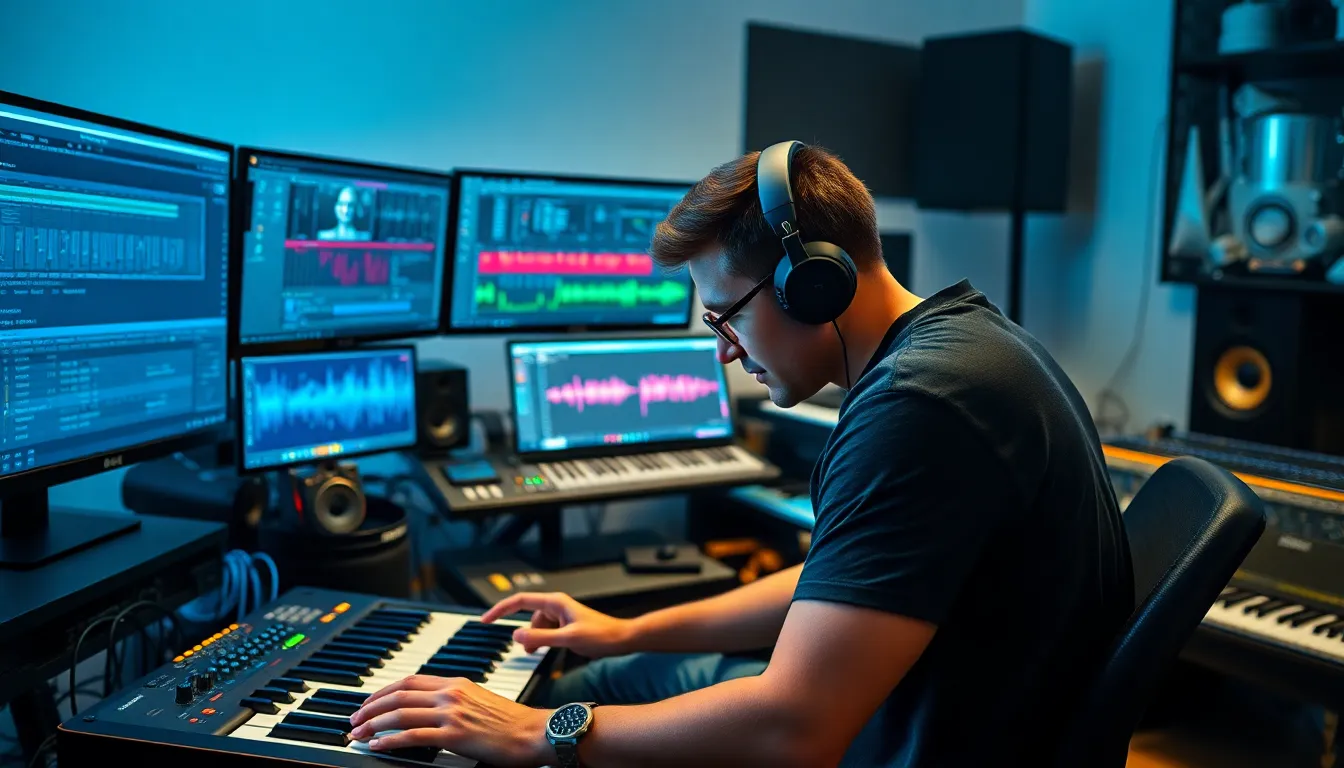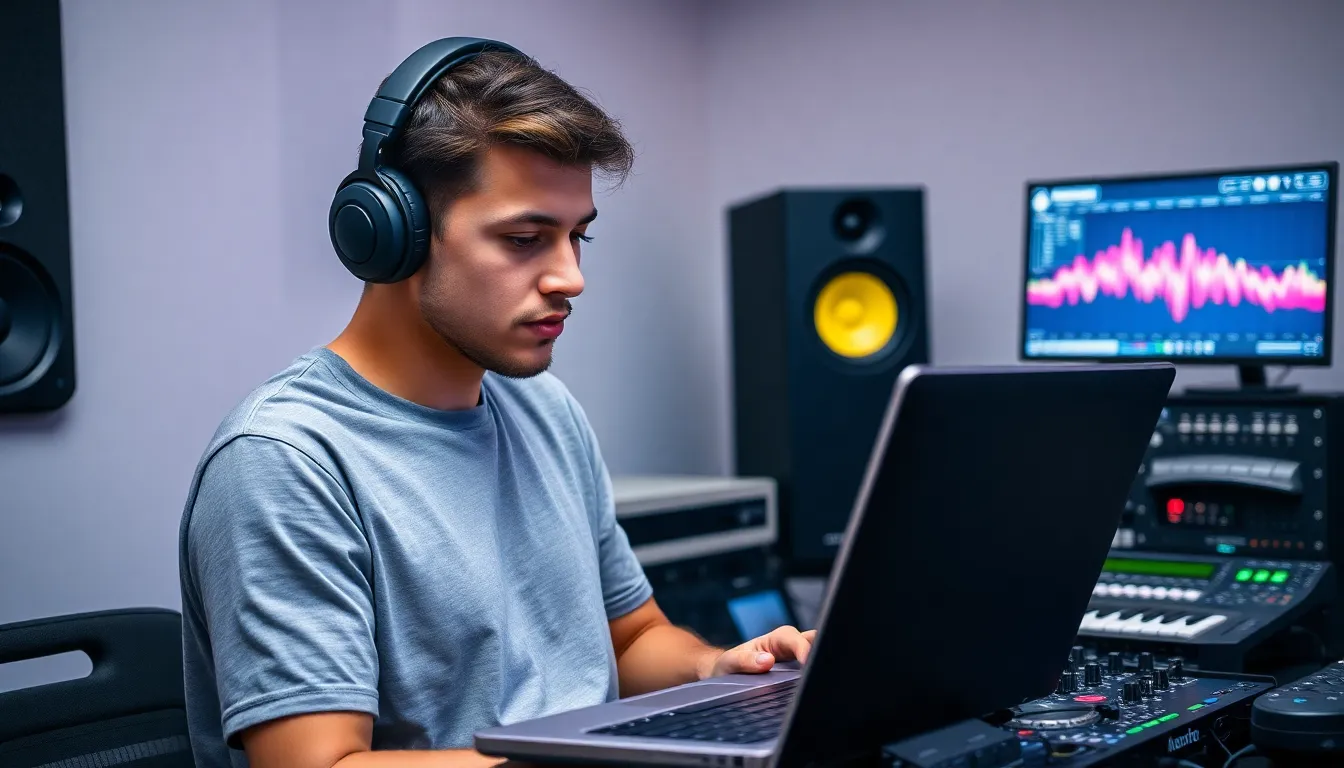Music technology is revolutionizing the way artists create, produce, and share their work. From digital audio workstations to innovative software plugins, musicians now have an array of tools at their fingertips that were once unimaginable. This evolution not only enhances creativity but also democratizes music production, allowing anyone with a passion for sound to contribute to the industry.
As technology continues to advance, the landscape of music is rapidly changing. Streaming platforms, AI-generated compositions, and immersive experiences like virtual reality concerts are reshaping how audiences interact with their favorite artists. Understanding these trends is crucial for anyone looking to navigate the modern music scene, whether they’re a budding musician or an industry veteran. Explore how music technology is shaping the future and discover the exciting possibilities that lie ahead.
Table of Contents
ToggleOverview Of Music Technology
Music technology encompasses the tools and processes that facilitate the creation, production, and distribution of music. Its significance lies in the empowerment of artists and the evolution of how music engages audiences.
Definition And Importance
Music technology refers to the use of electronic devices, software, and methods to enhance the music-making process. It includes equipment like synthesizers, sound mixers, and software like digital audio workstations (DAWs). Understanding music technology is vital for artists, as it expands creative possibilities and enables efficient production. Additionally, technology democratizes access to music production, allowing a diverse range of voices to enter the industry.
Evolution Through The Years
Music technology has undergone significant changes since its inception.
| Year | Development | Impact |
|---|---|---|
| 1920s | Electric instruments | Inaugurated electric sound manipulation |
| 1960s | Multitrack recording | Enabled complex music arrangements |
| 1980s | MIDI technology | Standardized communication between devices |
| 2000s | Digital audio workstations | Revolutionized home music production |
| 2010s | Streaming services | Transformed music distribution and access |
Each technological advancement introduced greater creative freedoms for musicians and altered the industry landscape, making it essential for artists to adapt and innovate continually.
Key Components Of Music Technology

Music technology encompasses various essential components that facilitate music creation and production. Key among these are digital audio workstations (DAWs), MIDI technology, and audio interfaces.
Digital Audio Workstations (DAWs)
Digital audio workstations serve as central hubs for music production. They allow users to record, edit, and mix audio tracks seamlessly. Popular DAWs, such as Ableton Live, Logic Pro, and Pro Tools, provide a range of functionalities, including virtual instruments and audio effects. These platforms enable artists to experiment, fine-tune compositions, and collaborate remotely, leading to innovative soundscapes and heightened creativity.
MIDI Technology
MIDI technology plays a vital role in modern music production. It transmits digital signals that represent musical notes and control various aspects of sound generation. Instruments like synthesizers and drum machines can connect through MIDI, allowing musicians to play and manipulate sound in real-time. This flexibility offers composers enhanced control over their performances, facilitating dynamic arrangements and varied textures in their music.
Audio Interfaces And Monitoring
Audio interfaces bridge the gap between instruments, microphones, and computers, converting analog signals into digital. These devices ensure high-quality sound capture and playback, essential for professional music production. Monitoring systems, including studio monitors and headphones, provide accurate sound representation, allowing musicians to evaluate their work objectively. High-quality audio interfaces and monitoring setups significantly impact the overall sound quality of recordings and mixes.
Impact On Music Production
Music technology significantly transforms music production, enhancing accessibility for artists and innovating sound design techniques.
Accessibility For Artists
Accessibility for artists is greatly improved through advancements in music technology. Digital audio workstations (DAWs) and cloud-based platforms enable creators to produce high-quality music from anywhere, regardless of budget or location. Artists without access to professional studios can utilize affordable software and online collaboration tools. This democratization fosters diverse voices in the industry, as emerging musicians are empowered to share their work widely.
Changes In Sound Design
Changes in sound design stem from the capabilities offered by music technology. Innovative software plugins and virtual instruments allow producers to sculpt unique sounds without traditional constraints. Techniques such as sampling and synthesis enable the manipulation of audio in creative ways, encouraging experimentation and originality. Additionally, advancements in audio effects, such as spatial audio and immersive sound technologies, expand the artistic palette, enriching music experiences for both creators and listeners.
Educational Aspects Of Music Technology
Music technology plays a crucial role in education, offering various resources that enhance learning experiences for aspiring musicians and producers. Those engaging with music technology can access numerous online courses and tools designed to facilitate their growth.
Online Courses And Tutorials
Online courses and tutorials provide structured learning environments ideal for exploring music technology. Platforms such as Coursera, Udemy, and Skillshare offer specialized courses in digital audio workstations, sound design, and music production techniques. These courses often include video tutorials, assignments, and community feedback, enabling learners to practice skills at their own pace. Moreover, institutions like Berklee College of Music provide professional certificates in music technology, helping participants build portfolios that showcase their knowledge and expertise.
Tools For Music Learning
Numerous tools enhance the educational experience in music technology. Applications like Ableton Live, Logic Pro X, and FL Studio provide hands-on experience in music production. Interactive software, such as Noteflight and MuseScore, aids in learning music theory and composition through real-time feedback. Additionally, platforms like Soundtrap offer collaborative environments, allowing users to create and share music projects with peers.
These resources empower learners to experiment with various genres, techniques, and equipment, thereby cultivating skills essential for a successful career in music.
Future Trends In Music Technology
The ongoing evolution of music technology heralds significant changes in how music is created and experienced. Innovations in artificial intelligence and virtual reality are poised to shape the industry.
Artificial Intelligence In Music
Artificial intelligence (AI) significantly reshapes music composition and production. AI-driven tools analyze vast data sets, enabling automated music generation and personalized recommendations. These systems assist composers by suggesting chord progressions, melodies, and arrangements, streamlining the creative process. For example, platforms like OpenAI’s MuseNet can craft complete compositions across various genres in a matter of minutes. Additionally, AI enhances the mixing and mastering processes, allowing speedier production with higher quality outputs.
Virtual And Augmented Reality Developments
Virtual reality (VR) and augmented reality (AR) are redefining how audiences engage with music. VR platforms allow users to immerse themselves in 3D concert experiences from home, creating a sense of presence with artists and fellow fans. AR applications enhance live performances by overlaying digital visuals onto physical environments, providing interactive experiences that captivate audiences. For instance, apps like Oculus Venues enable fans to attend virtual concerts, experiencing immersive environments that traditional concerts can’t replicate. These technologies foster deeper connections between artists and audiences, transforming the music landscape.
Music technology is reshaping the music landscape in unprecedented ways. Artists now have access to powerful tools that not only enhance creativity but also democratize music production. As technology continues to evolve the relationship between creators and their audiences deepens.
With advancements in AI and VR the future of music holds exciting possibilities. These innovations promise to create more immersive experiences and foster stronger connections. Embracing music technology is essential for artists and industry professionals alike who wish to thrive in this dynamic environment.
The journey of music technology is just beginning and its impact will only grow. Exploring these advancements can lead to new creative horizons and opportunities for everyone involved in the music scene.




